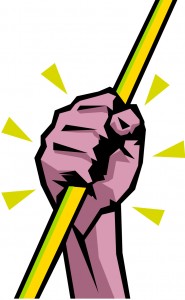Phinehas the priest stood for righteousness by taking a stand against wickedness. At the same time, Zimri compromised morally and followed the lusts of his flesh by succumbing to the ways of this world as he fell into fornication with a heathen woman.
Numbers 25:7, Phinehas…took a javelin. Phinehas, the priest, rose up against evil and took a stand for righteousness and YHVH commended him for it. In this case, the grandson of Aaron the high priest was not acting as a self-appointed vigilante as it may appear. Rather, YHVH had given the priests the authority to act as judges in Israel and to pronounce sentence in criminal matters (Deut 17:9–11). 
Additionally, Phinehas was doubly justified in his action against the fornicators (Cozbi and Zimri), since he was an eyewitness of these sexual crimes, and the Torah teaches that the hand of the eyewitness was to be the first to rise up in executing judgment against the criminals (Deut 17:6; Ezek 44:24). So as an eyewitness and as a priest, he was legally justified in his actions. The priests and Levites were to act as Israel’s legal experts (Lev 10:10–11; Deut 24:8; 33:10; 2 Chron 17:9; 30:22; Neh 8:2, 8; Hag 2:11; Ezek 44:23; Mal 2:7) and to make determinations between the holy and the profane (Ezek 22:26; 44:23).
Who are YHVH’s priest on the earth today? According to Peter, and John the saints are those priests (1 Pet 2:7; Rev 1:6; 5:10; 20:6). As such, the saints presently possess the divinely mandated legal authority to fulfill the responsibilities of the priesthood of old when it comes to Continue reading

